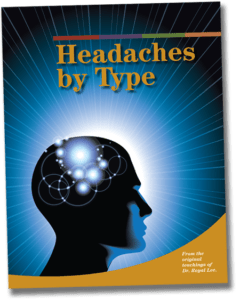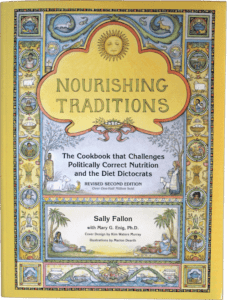A recent conversation with a friend reminded me that my self-health tale has had two very different parts to it. The first chapter, “Flying Solo,” is when I blindly attempted to find resolutions to the conflicts in my story all on my own. The second chapter, “Seeking Help,” came about after I encountered the frustration of flying solo. That’s when I realized there was a lot to be said for the fine-tuned balance my body was looking for.
You see, this friend of mine has suffered from debilitating headaches for years, and she’s starting out on her own “Flying Solo” chapter. Looking for a non-medication  approach, she wants to find the root cause of her headaches and eliminate the need for her prescription. Kudos, my friend!
approach, she wants to find the root cause of her headaches and eliminate the need for her prescription. Kudos, my friend!
My friend knows the type of writing I do here at SRP, so she asked me if her headaches could be traced back to certain vitamin deficiencies or the fact that her gallbladder was removed nearly eighteen years ago. Now it just so happens that one of the categories in the Headaches by Type booklet from SRP is the gallbladder. While I was happy to share this information with her, I did so with caution.
Why the caution? Well, I couldn’t help but think of where my own first chapter had left me. If I heard of any supplement or miracle food that might help me feel more like myself again, I was quick to buy it. Unfortunately, this only left me with a large canvas bag filled with half-empty bottles of various liquids and pills. I remember my confusion when I read opposing claims about the very same nutrient. My mediocre success left me feeling…mediocre.
Not willing to live with mediocrity on a daily basis, I finally sought the help of a certified clinical nutritionist. This chapter of my self-health tale opened my eyes to some important facts about nutrition that the general public doesn’t know about. Unless you seek it out from a reliable source, you could go your whole life without learning essential nutrition information.
For all you new self-healthers out there, here are five things you need to keep in mind:
1. The Whole Food Difference in Supplements
Not all nutritional supplements are created equal. Your body needs whole food nutrients—as opposed to synthetic versions that you likely won’t even be able to process.
2. Individual Nutrients Aren’t Enough
Singling out one individual nutrient isn’t the answer. This is where the fine-tuning comes in. So many nutrients out there are dependent on one or more other nutrients (or fats) to do their job. For example, every tissue in the body needs calcium. But you need vitamin D to absorb it out of the gut and into the blood. And you need vitamin C complex to move calcium from the blood to the bone and teeth. You need vitamin F (fatty acids complex) to move calcium from the blood to the muscle tissue, cell fluids, and cytoplasm. So when it comes to the physiological challenge of regulating the most abundant mineral in your body, vitamins F and C are the partners of vitamin D.
3. Supplements Can’t Replace Diet
Supplements cannot take the place of a nutrient dense diet. If you take the highest quality supplements but still eat lots of processed, sugary foods, your health will be lacking. The reason they’re called “supplements” is that they should be used to fill in any gaps you might have in your nutrient dense diet.
4. Your Body Needs Time to Heal
You have to allow your body time to heal. There’s no such thing as overnight success when it comes to your health. If your body has been trying to compensate for or deal w ith an issue for the last eighteen years, you’ll need some time to support your overall system before you understand the full potential of any nutritional changes you make. Trust in the process and stick with it.
ith an issue for the last eighteen years, you’ll need some time to support your overall system before you understand the full potential of any nutritional changes you make. Trust in the process and stick with it.
5. Traditional Diets Are Best
Lastly, a traditionally prepared diet is best. Whether it’s fermented foods or organ meats, there’s a reason why the traditional foods our ancestors ate led to less chronic disease. Your body craves food that’s been prepared with proper digestion in mind—not food that you can speedily heat up in a microwave. The first resource I used to become familiar with traditional cooking was Sally Fallon’s Nourishing Traditions. It’s so much more than a cookbook.
Of course, my self-health education continues to expand in this second part of my self-health tale. I gladly share what I’ve learned with the caveat that I just want to offer a new perspective. Seeking the help of a trained professional can be all the difference in your self-health tale having a happy, mediocre, or tragic ending.
Photo from iStock/ Everste
Related Topics
whole food nutrition | whole food supplements



Good article and spot on! I too have spent a ridiculous amount of money trying to mitigate symptoms of unknown origin. I even have a holistic nutrition certification and STILL couldn’t figure things out. There is definitely a time and place to enlist help or risk causing more imbalance in the body. Btw, my constant headaches turned out to be lyme disease along with chronic cerebrospinal venous insufficiency brought on by a recently discovered, malaria like parasite called protomyxzoa. Yeah, it would have been impossible to sort all that out without direction. When the obvious fails, you know you need help.
Thank you for taking the time to read and comment on my post, Holli! It sounds like your self-health journey has had many a twist and turn. I’m glad you stuck with it and found the cause of the challenges you were dealing with. I would love to hear what type of practitioner you found that was able to help you figure it all out!